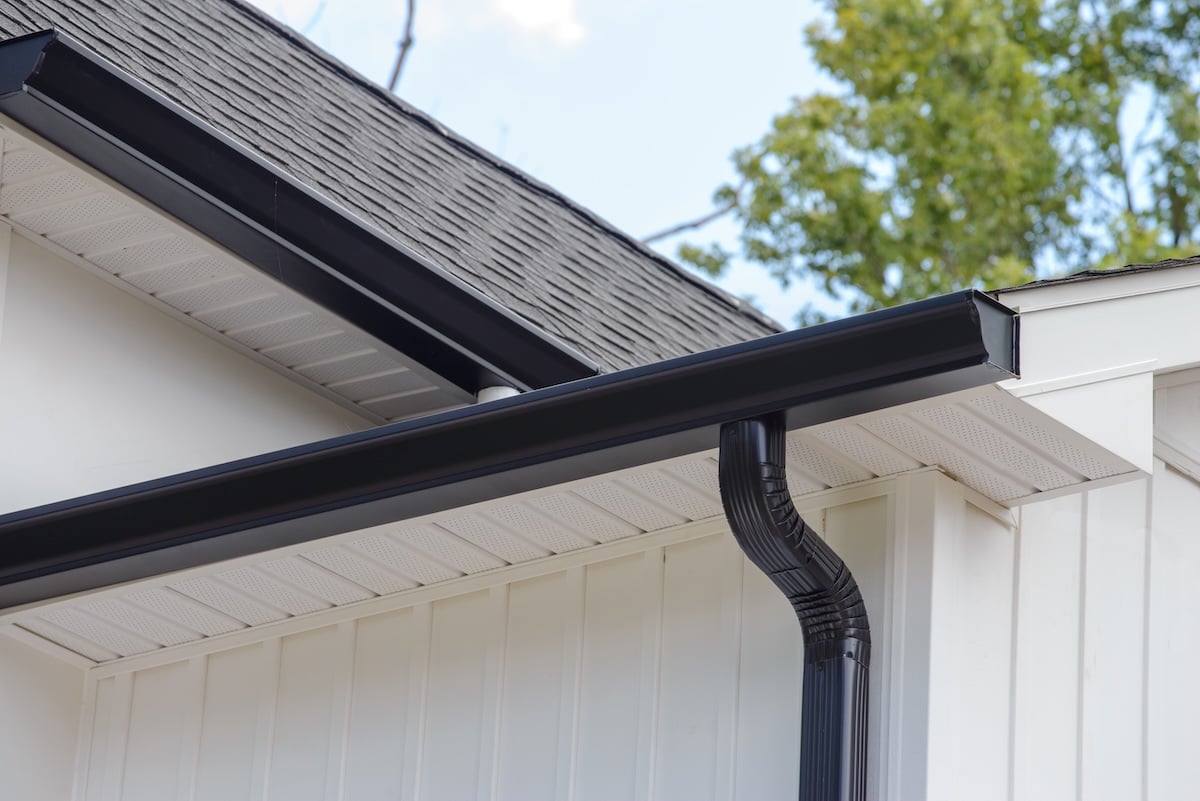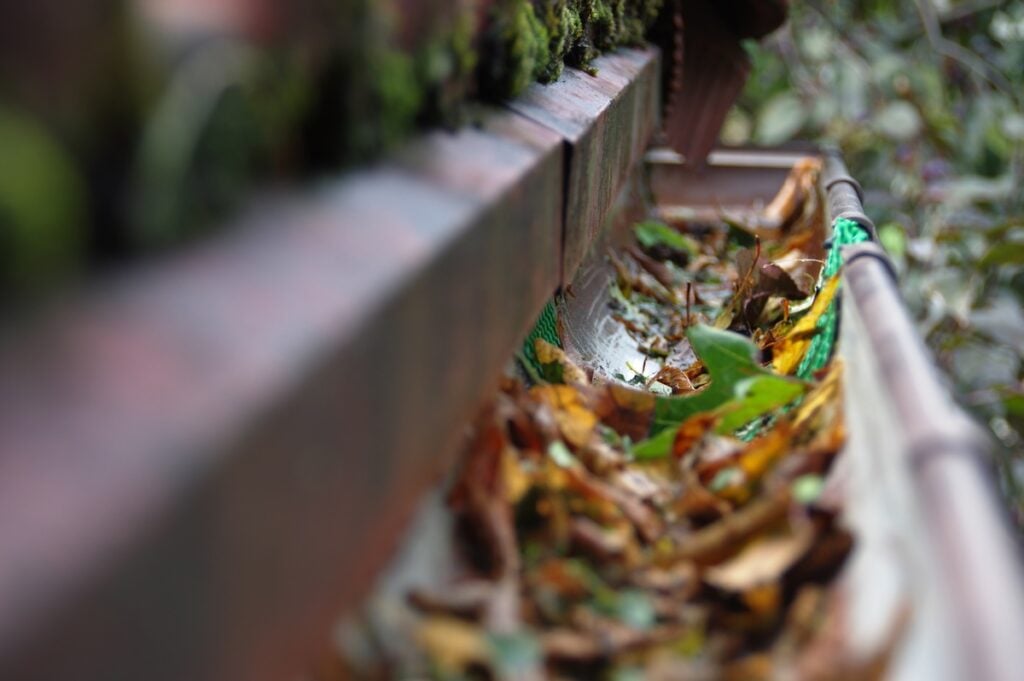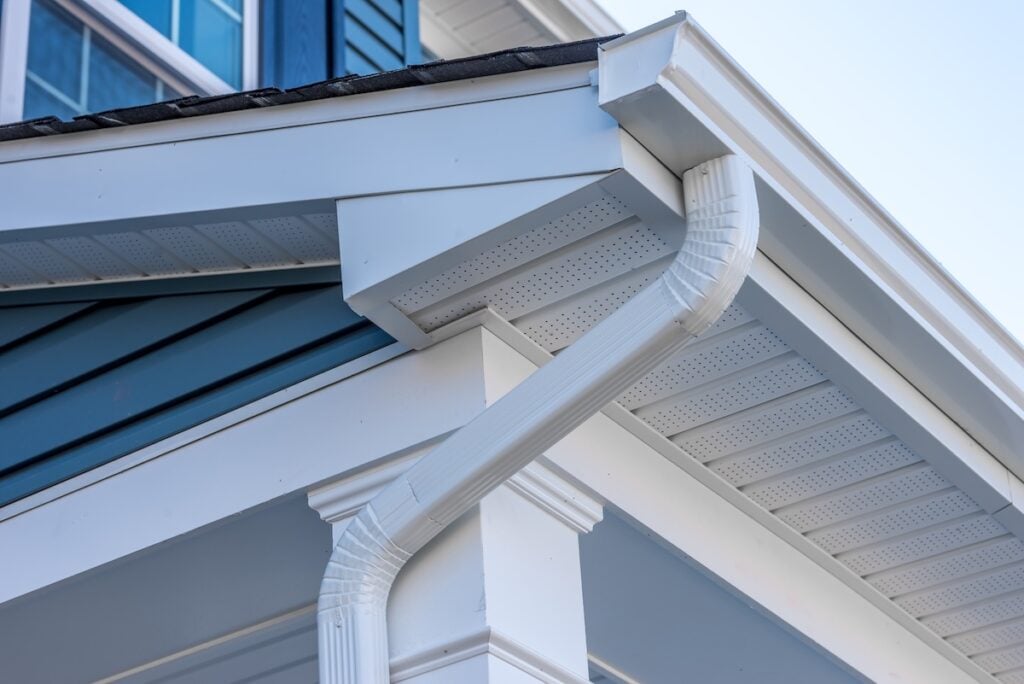
6 Types of Gutters for a Longer-Lasting Roof (Gutter Systems)
 5/27/2025
5/27/2025 7 Min Read
7 Min ReadUnderstanding the different types of gutters is essential for protecting your roof and ensuring your home stands up to rain, snow, and seasonal debris. While they may seem like a small feature, gutters play a huge role in directing water away from your roof, siding, and foundation—helping to prevent expensive structural issues over time.
- Prevents water damage: Proper gutters help manage runoff and avoid leaks, rot, and erosion.
- Improves roof lifespan: Reducing standing water extends the life of your roofing material.
- Boosts curb appeal: Modern gutter systems come in attractive styles that match your home’s exterior.
In this guide, we’ll explore 6 types of gutters homeowners can install to support a longer-lasting roof—along with the pros, cons, and ideal applications for each.
❗️ Why Gutters Matter for Roof Health

Water Management Is Critical
When it rains, your roof sheds hundreds of gallons of water—sometimes in just one storm. Without properly functioning gutters, that water runs straight off the roof edge and can soak into siding, flood your basement, or erode your landscaping.
- Roof rot prevention: Water that backs up under the shingles or pools at the eaves can cause wood rot and mold.
- Foundation protection: Gutters channel water away from your home’s base, helping to prevent settling or cracks.
Gutters Support All Roofing Materials
Whether you have cedar shakes, asphalt shingles, or metal roofing, water damage is a universal risk. Gutters and downspouts work together to protect the edge of the roof, fascia, and soffit—especially during heavy storms or freeze-thaw cycles.
✅ How to Choose the Right Gutter System
Consider Your Climate and Roof Pitch
The steeper your roof or the heavier your regional rainfall, the more capacity your gutter system needs. For example, a shallow-pitch roof in the Midwest may only need 5-inch gutters, while a steeper roof in a rain-heavy region might need 6-inch or oversized gutters. Undersized gutters in high-flow areas can overflow easily, leading to water damage and foundation issues.
Think About Material Compatibility
If you have a cedar shake roof, for instance, metal compatibility is crucial. Some metals (like aluminum) pair well with wood, while others (like copper) may require buffer layers to avoid chemical reactions with tannins in cedar. Ensuring material compatibility extends the lifespan of both your roofing and gutter systems.
Don’t Forget Gutter Guards
Gutter guards help keep out leaves, pine needles, and other debris—minimizing clogs and reducing how often you need to clean the system. They also improve water flow during storms and reduce the risk of ice dams forming in colder climates.
📋 6 Types of Gutters for a Longer-Lasting Roof
- K-Style Gutters: The most popular style for modern homes, K-style gutters resemble decorative crown molding. They offer high capacity and a flat back, allowing them to mount directly to the fascia.
Best for: Asphalt shingle or composite roofs with moderate-to-steep pitches
Material options: Aluminum, vinyl, steel, copper
Pros: Stylish profile, strong water capacity
Cons: Can be harder to clean due to inner angles - Half-Round Gutters: As the name suggests, these are shaped like a half-circle and typically found on older or historic homes. They’re especially common with clay tile or cedar shake roofs.
Best for: Homes with cedar shake, tile, or slate roofing
Material options: Copper, aluminum, galvanized steel
Pros: Smooth shape helps prevent debris buildup
Cons: Lower capacity and often more expensive to install - Box Gutters: These wide, square-shaped gutters are usually built into commercial or historic buildings but can also be custom-built for residential homes with large roofs.
Best for: Large residential roofs or custom home designs
Material options: Galvanized steel, copper, aluminum
Pros: High capacity and sleek integration with the roofline
Cons: Typically more expensive and often requires professional installation - Fascia Gutters: These are custom-built to act as both fascia board and gutter system, giving a clean, seamless look that blends well with modern architecture.
Best for: Contemporary homes or homes without fascia boards
Material options: Aluminum or steel
Pros: Streamlined appearance, fewer seams
Cons: More costly and usually only available in seamless formats - Seamless Gutters: Made from a single piece of material, seamless gutters reduce the chance of leaks and require less maintenance over time.
Best for: Any home, especially those in areas with frequent rainfall
Material options: Aluminum, steel, copper
Pros: Fewer joints means fewer leaks and cleaner look
Cons: Must be professionally installed and measured on-site - Vinyl Gutters: Lightweight and affordable, vinyl gutters are an easy solution for budget-conscious homeowners or DIY installations.
Best for: Small to medium homes in mild climates
Material options: PVC-based plastic
Pros: Easy to install, low cost
Cons: Can warp in extreme temperatures or crack under impact
⭐️ Gutter Materials: Pros and Cons

Aluminum Gutters
- Lightweight and rust-resistant: Easy to install and low maintenance.
- Paintable: Available in many colors to match your exterior.
- Not ideal for: Homes with high winds or falling branches.
Copper Gutters
- Long-lasting beauty: Copper develops a natural patina over time.
- High durability: Can last over 50 years with minimal maintenance.
- Premium pricing: One of the most expensive options.
Steel Gutters
- Strong and impact-resistant: Good for storm-prone areas.
- Can be galvanized or stainless: Choose based on budget and climate.
- May rust: Requires regular inspections and repainting.
Vinyl Gutters
- Affordable and easy to install: Ideal for quick fixes or budget builds.
- UV resistance varies: Cheaper models may fade or crack in sun exposure.
- Not suitable for extreme climates: Can warp or weaken over time.
👉 Gutter Guards and Accessories
Types of Gutter Guards
- Screen guards: Fine mesh screens that keep out larger debris.
- Surface tension guards: Allow water to flow in while leaves slide off.
- Foam inserts: Fit inside the gutter and block debris while letting water pass.
Downspout Extensions
These direct water farther away from your home’s foundation, which is especially important during heavy rains or snow melts. They help prevent soil erosion and reduce the likelihood of water seeping into basements or crawl spaces.
Splash Blocks and Rain Chains
Splash blocks protect landscaping by directing water away from a building’s foundation, helping to prevent erosion and water damage. Rain chains add a decorative touch to water drainage systems, transforming the flow of rainwater into a visual feature. They also reduce splashing compared to traditional downspouts and can be paired with basins or barrels for water collection. Together, they enhance both the function and aesthetic of a home’s exterior drainage.
🛠️ Gutter Maintenance Tips for Homeowners
Clean Your Gutters Regularly
Even the best gutters can clog if neglected. Clean them at least twice a year, especially after fall and spring when leaves, pollen, and other debris collect.
- Clog prevention: Blocked gutters can back up and rot your roof edge or fascia.
- Water control: Overflows can damage siding or leak into basements.
Inspect During Every Season
- Spring: Look for sagging or animal nests.
- Summer: Check for sun damage or discoloration.
- Fall: Remove leaf buildup.
- Winter: Watch for ice dams or frozen blockages.
Schedule Professional Inspections
A professional roofing and gutter contractor can identify issues you may overlook and make recommendations based on your home’s needs.

👍 How Gutters Extend Roof Life
Properly installed and maintained gutters reduce wear on your roof by managing moisture, limiting freeze-thaw damage, and directing debris and contaminants away from shingles or shakes.
- Cedar shake protection: Minimizes mold buildup and water pooling at the roof edge.
- Shingle preservation: Prevents granule loss due to overflow or pooling.
- Fascia and soffit health: Protects these vulnerable areas from rot and pests.
✅ Choose the Right Gutter System with Shake Guys
Now that you understand the different types of gutters and how they contribute to a longer-lasting roof, you can make a smart, informed decision for your home. Whether you need a seamless gutter system for your modern build or half-round copper gutters to complement your cedar shake roof, choosing the right fit ensures better protection and lasting beauty.
At Shake Guys, we specialize in complete roof and gutter solutions—especially for cedar shake roofs and premium home exteriors. Our expert team can assess your current setup, recommend the best gutter system for your roof material, and handle installation with care and precision.
Request your free inspection today and discover how the right gutter system can improve your roof’s performance and lifespan with help from the trusted professionals at Shake Guys.


Schedule a Free Inspection & Consultation
We look forward to providing you with premium customer service & high-quality results.